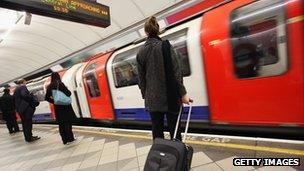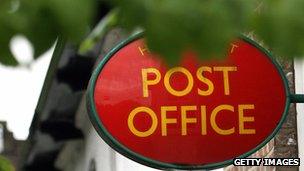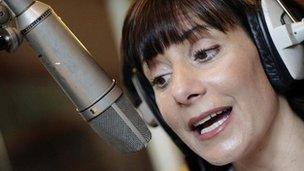Meet the real Siri and other iconic voices of technology
- Published
Meet the real Siri, and three other iconic voices of everyday technology.
Millions of people hear their voices every day - but would you recognise them if you saw them walking down the street?
Well maybe now you will.
The BBC met the faces behind four of the most famous and iconic voices heard in technology today.
Jon Briggs - The British 'Siri'
Siri, Apple's voice-powered personal assistant, made its debut in June 2010. Since then, millions of the devices with the feature have been sold worldwide.
In the UK, the voice you will hear responding to commands belongs to Jon Briggs, an illustrious voiceover artist whose portfolio includes the likes of the Weakest Link, Radio 2 and Channel 4.
Jon had offered up his voice to a firm that specialises in computer-generated speech - that is, taking Jon's voice but moulding it to say virtually any possible phrase. Apple, when creating Siri, picked out Jon - unbeknownst to him.
"I discovered that I was being used as the voice of Siri when Rory Cellan-Jones, the BBC technology correspondent, suddenly started demonstrating it on BBC Breakfast.
"I thought 'I recognise that voice!', and so it was true - and it's a slightly bizarre journey since then."
It means that while his voice is now being played out countless times a day all over the country, Apple has not paid him - he only received the fee earned he when recording the original material.
But, he says he's excited to be "in early" on what he believes is changing how we use technology.
"You can take a photograph of your desk - there is a screen a keyboard and a mouse.
"You will show it to your children or your grandchildren and they will laugh and go 'you had a thing called a mouse? What's that funny thing with letters on?'"
Emma Clarke - Voice of the London Underground

Emma's voice can be heard on several London Underground lines
In contrast to the received pronunciation of her "Tube" voice, Emma Clarke's speaking voice is in fact Northern - growing up, as she did, in Sale near Manchester.
Her voice can be heard across the Bakerloo, Central and District lines of London's iconic Underground network.
The process of getting the job was long and painstaking - months of focus groups and whittling down possible candidates. During the selection, each possible voice was given a codename. Emma's, apparently, was 'Marilyn'.
"Had they named me 'Brenda' I'm not sure I'd have got the gig," she jokes.
She now gets fan mail from all over the world, particularly from Texas.
"People initially thought I was actually on the train!" she says, "Or in some kind of central control room. I don't know where they thought it was."
She says she is proud to lend her voice to the network, but adds that she hopes some of the lines she recorded never have to be heard by the public.
"There were a couple of emergency announcements, that I remember when I read them on the script I thought 'oh god, imagine how these people will feel when they hear these announcements.
"I felt such a sense of responsibility, of calming people down."
Terry Green - 'Cashier number three, please!'

Terry can be heard at over 8,000 shops in the UK - including many Post Offices
Unlike the other voices in this piece, Terry Green is the only one who doesn't consider his voice to be his profession.
He found his way to audio fame indirectly. He specialises in customer service, and the systems used in shops to get things moving and punters through the tills.
And so it was, when the company he was working for needed a male voice to beckon people to the till, he stepped forward: "Cashier number three, please..."
"We just sat down with a digital voice recorder, laid down the track, and that was it! I was on the prototype system, and then suddenly rolled out to 8,000 shops."
They recorded up to cashier number 25 - but now the system goes much further. Indeed, around the world, the company's technology is used in thousands of stores - although with local voices instead of Terry's.
Now he makes his living as a leading expert on the study of shoppers' behaviour.
"My voice was on all these systems that we were rolling out, so I was becoming more and better known. I started writing white papers, and eventually I came to write a book."
Sara Mendes da Costa - The Speaking Clock

Sara was unveiled as the latest voice of the speaking clock in 2007
One morning, Sara Mendes da Costa was listening to Terry Wogan on Radio 2 when he mentioned that a competition would be held to find the new voice of the Speaking Clock.
"A little bell rang in my head and I went 'oooh!'"
She wasn't alone - within moments she had had calls friends and family saying she should put herself forward.
She won, and from 2007 she took over the voice of the Speaking Clock, which is called up approximately 60 million times each year.
It was a job she was excited, but nervous, to take on.
"Brian Cobby, who sadly passed away last year, had the most beautiful, rich, Shakespearian voice.
"Then I came along - I have visions of people going 'oh...'!"
"But they wanted something different, someone a bit more of the moment, a little bit more who we are now."
Sara uses the Speaking Clock regularly in her day-to-day work, and admits she just can't resist listening to each and every word.
"I listen until when it goes through to 'precisely' - and only then I can hang up!
"It's just a weird thing that I've got."
Follow Dave Lee on Twitter @DaveLeeBBC, external
- Published11 October 2013
- Published12 September 2012